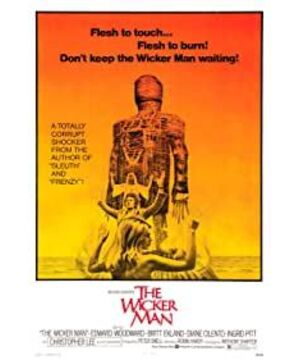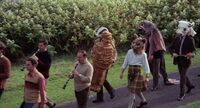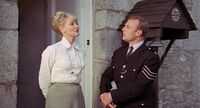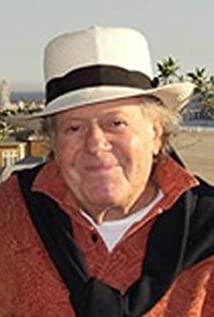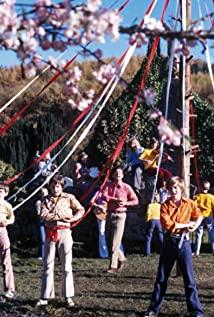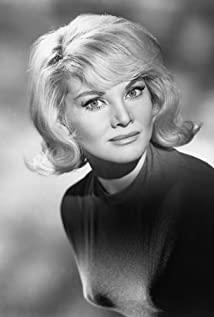Simply looking at the literal meaning, "The Pagan" is a typical cult film, filled with pagan customs, fanatical worship and the most terrifying death. But if you just use the word cult to conclude the movie, it is obviously too small. Director Robin Hardy is a horror film lover with ideas and pursuits. Because he was dissatisfied with the same "vampire" horror films at the time, he made a more terrifying interpretation of "horror" in "Hearts". The reason why this film can be called a classic is that it shows step by step how hunters become sad prey, and depicts an ancient ritual that takes place in modern times in a nearly documentary style. As a result, the horror is no longer just the horror of the picture, but the self-reflection in your heart all the time, because maybe from someday, you will become a "infidel" among the people.
The Hunter is hunted. Until
the last moment of the movie, no one can tell that this is a horror movie. Especially the kind of people who are naturally curious, such as me, for most of the time in this film, it is like watching the BBC's "Discovery". If in 1973, it was not police officer Howie who came to this beautiful name—Natsushima to investigate the disappearance of Loli, but me, I would definitely be fascinated by the beauty of Taoyuan here. As soon as Howie went ashore, he visited and investigated. What is puzzling is that everyone on Xia Island denies the girl's existence, whether on the street or in a pub, and even the girl's mother is indifferent.
In any case, you will be at ease if you come. On the first night of Summer Island, Howie stayed at the Green Man Hotel (in fact, I really want to say this is the Orc Hotel, because the green man on the sign is like the orc drudgery in Warcraft). That night, Howie discovered that the residents of the island had sex in groups in the open air, and even a boy was sent to the hotel to have sex with the owner's daughter. The more puzzling thing was still the next day. Howie finally found the missing girl's desk in the classroom. He gradually discovered that the people on the island had deliberately concealed the fact that the girl was missing. What's more frightening is that the girl is probably already dead! For this reason, Howie began investigating the owner of the island, Lord Summer Island. The Lord claims that everyone is law-abiding and gentle believers, and there is no murder or kidnapping. Of course, the believers he was talking about were not Christ, but the sun god. Howie also dug the girl's grave to try to find the body, but only saw a dead hare.
At this point in the film, the plot development is still like a Sherlock Holmes-style detective story. Both the audience and Howie are puzzled by the possible logic of a murder and lost in the strange customs on the island. The persevering Howie finally found the "answer" in the library of Natsushima: It turned out that Natsushima, which relies on exporting apples for its economic source, failed every year but failed last year. In order to pray for the sun god and agricultural goddess to have a good harvest in the coming year, the islanders had to burn a virgin to death on the "May Festival" and sacrifice to the gods. And this girl must be hidden a few months before the sacrifice. Howie and the audience suddenly felt that the truth became clear. The hunter is finally about to catch the prey! The next day was "May Day", Howie's transportation happened to break down again. Originally, he wanted to return to the police station to rescue soldiers and decided to carry out the hunt to the end.
There was a grand parade before the "May Festival" and everyone on the island participated. Howie stunned the innkeeper who was playing the clown, put on the clown's costume and mixed into the parade. Finally, he found the missing girl who was tied up. Howie made a prompt decision, knocked out the guards, and took the girl to escape from the cave. When he and the girl got out of the cave, he found that the Lord was already waiting outside the cave. The girl ran to the lord happily, and Howie was dumbfounded. It turns out that there is only one truth: Howie, a hunter, is the real prey. He was brought here step by step because as a devout Christian (in the eyes of the islanders, he is a pagan), Howie is a sacrifice The best sacrifice for the gods to pray for a good harvest. In the enthusiastic carnival and singing, Howie was stuffed into a huge wicker man and burned by fire.
The hunter is hunted, the hunter who tracks the prey is caught by the prey instead. This is the horrible situation set in "Hearts". In the burning flames of the wicker man, I couldn't help thinking back to the scenes before the movie, recalling the true meaning of the words the Lord, the shopkeeper, the teacher, and the little girl in the classroom said, and I was scared into a cold sweat. There is nothing more frightening than knowing that the truth is in your hands, but step by step into a death trap without even realizing it is more frightening. At the beginning of the film, Howie once said in the church that Christians sipping red wine symbolizes drinking the blood of Jesus, and eating bread symbolizes eating the flesh of Jesus. Because Jesus made atonement for mankind with his personal sacrifice and resurrection. At the end of the film, Howie became a victim of pagans, dedicated his blood and flesh to the harvest of Summer Island. This back and forth echo is like a fateful rope, which makes people feel a kind of suffocating terror.
Clash of the Gods
Why did humans invent horror movies? Is it just to scare yourself to seek excitement? I'm afraid the director Robin Hardy will never agree. In an interview, Robin said: "Horror films are a very serious form of drama in my opinion." After thinking about it a little bit, Robin's remarks are really insightful. When the horror of "Hearts" gradually eased, what emerged on the surface of the image was his profound insight into the "controversy of the gods" in human history. The so-called "Battle of the Gods" was originally proposed by the modern German sociologist Max Weber, which refers to the violent conflict between different values in social ethics. And this is a metaphor for the conflicts, wars, killings and even the animals in "Hearts" in the name of different beliefs in human history. "Pagans" was originally a scornful term for non-Christians by Christians in history, but who are the "Pagans" in this film? Is it an islander or Howie?
To answer this question, you might as well start with Howie and make all the metaphors in the film white. This requires recognizing Howie’s dual identities. First, he is a devout Christian and an old virgin, and secondly, he is a rational policeman in modern society.
As a Christian, Howie even reveals a taste of the Middle Ages, not pious like a modern person. From the very beginning, he sang hymns in the church and preached the way of Christ's salvation, and the movie has defined the character. After arriving on the island, Howie prayed before going to bed every day, and was very upset about the phenomenon of open-air sex on the island, naked women dancing, etc., because this is really offensive in Christianity. In the school, the teacher openly explained to the children that the male genitalia is a symbol of reproduction and an object that must be worshipped, which aroused Howie's anger even more. In his opinion, worshiping the genitals has gone beyond the scope of vulgarity and has become a kind of "paganism", that is, a cult. Historically, wars launched in the name of Christ, such as the Crusades, were all "infidels." Strong rejection of heresy is an important feature different from religions such as Christianity and Buddhism. And Xia Dao is a "pagan" island. The flag of the sun god is flying on the island, and stick-shaped objects (symbols of penis) woven from wicker are hung in classrooms, hotels, and small shops. Obviously, this is not the city of God, but the kingdom of the sun god, and the two gods will inevitably have disputes.
The bridge section in the cemetery illustrates this point. In the cemetery of the abandoned Christian church, Howie found several sarcophagi abandoned by the islanders, containing the remains of former Christians. Seeing this desolate scene, Howie grief came from it, angrily made a simple cross from wood chips, and solemnly placed it on the sarcophagus to pray for the soul to rest in peace. The entire bridge was silent and cold, as if two gods were competing in silence. A more intense conflict occurred between the Lord and Howie. Howie believes that Jesus did not hesitate to be nailed to the cross as the incarnate Son, and resurrected three days later, in order to atone for mankind. However, the Lord believes that there is no sin and no resurrection. Death is just a change from one form of life to another. Believers who worship reproduction and reproduction cannot accept the incarnation and birth of Jesus. The lord even said, "Jesus? The child of the so-called Virgin is the son of ghosts in my opinion." Therefore, "the battle of the gods" comes to its root. In the end, it is a question of which god to believe in. Belief is not rational and cannot understand each other, so there are heretics. Even though Howie looked at everything on the island with a "pagan" eye with the Lord of Christ, he did not realize that as the only Christian on the island, he was the real "pagan."
Interestingly, Howie is an old virgin again, which once again puts him in a "different" situation. The piety of Christianity kept him like a jade. But the "sun religion" on the island worships the power of reproduction, and the islanders are full of fascination with sex. There are sexual similes and metaphors everywhere in the film. They go together wildly and sing songs that praise sexual intercourse; they erect totem poles symbolizing genitalia in front of their children; they trim the garden shrubs to look like penises... The woman sang like a siren. When the woman knocked on Howie's door, the old virgin's sexual desire was also stimulated. The god in his soul also competed with the sun god. Although Howie has controlled himself, there is only one abstinent person on this island of sex, so who is the real "infidel"?
Judging from the identity of Howey as a modern person, he also has an irreconcilable conflict with the local area. Although Howey is pious, he is, after all, a police officer, an official representative, and even a modern person. He knows how to limit his beliefs to the ethical level and reject fanaticism and superstition. At the beginning of the film, when he saw the slogan "Jesus immortal" on the wall, he ordered the craze to be wiped off. In other words, as a modern man Howie, he also has a god called "rationality." In addition to religious reasons, he opposed Sun Religion on the basis that "something like this happened in the twentieth century." This is against the perspective of enlightenment reason. Two gods live in Howie! When Howie was about to be burned to death, he suddenly shouted in desperation: "Natsushima's poor harvest is the law of nature! It is not the sun god, but the climate of Xiadao cannot meet the conditions for a bumper harvest!" At the end of life Moments, Howie also discovered the powerlessness of Christ, and turned to the assistant god to escape from the dead.
It is a pity that both Christ and the god of reason are pagan gods on Xia Island ruled by the sun god, and they are defeated in the battle of the gods. Howie was also forced to become a heretic and was sent to the Wicker Man. This can't help but reminds me of Europe in the Middle Ages, when Christians burned countless witches to death in the name of faith. And the people burned to death by the infamous Inquisition are enough to form a history of Chinese philosophy. They were put to death only because they were "infidels" in the eyes of Christians. Although it cannot be considered that Howie is paying off the Christian blood and tears hundreds of years ago, the director has clearly portrayed the fear of "different" vividly: when you find that all the people around you are fundamentally different from you, that kind of loneliness, Helplessness and despair constitute a deep fear.
ceremony
I think many people will try to find the original sound of the film after watching the movie. That's right, the thirteen repeatedly sung ballads in the film are really graceful. In the first half of the film, the songs appear especially dense, and even the director Robin once wanted to make a musical film altogether. Of course, I can't guarantee that I will feel horrified again when I listen, after all, these songs do sound evil.
Zi once said, "Thinking is innocent." The reason why the songs in "Hearts" are evil is not exaggerated by the horror atmosphere of the movie, but these songs can almost be regarded as prayer music for religious ceremonies. On the surface, these songs seem to be just beautiful folk songs, but a closer look at their lyrics shows that different music has a certain religious ritual orientation and can be regarded as a part of religious rituals. The most typical one is that when Howie went to the school to investigate the missing girl, he met a male teacher leading the children in an activity. The children danced and sang around a totem pole symbolizing the genitals. The lyrics are: "There are trunks on the tree, branches on the trunk, a nest on the branch, a bird in the nest, and a board on the bird. This board is the bed. There is a girl on the bed, a man on the girl, and a man on the man. On the mat, the child is on the mat, the man is on the child, the tomb is on the man, and there is a tree on the tomb." At first glance, this series of repetitive lyrics seems to be a folk song to interpret the life of a person, but in the movie, this The song can be regarded as a religious ritual, because the lyrics actually express the continuation of life during sexual intercourse, and the "tree" (genitalia) is a symbol of endless life.
In fact, in any religion, song and dance are indispensable. Even in China, which is known as an ancient civilization, the historical form of the so-called "ritual and music civilization" is also a kind of song and dance sacrifice. The most impressive sacrificial performance in "Hearts" is undoubtedly the "May Festival" sacrificial ceremony where Howie was burnt to death at the end of the movie, and this has indeed happened in history.
In the anthropological classic "Golden Branch" by British scholar Fraser, the prototype of the "May Festival" is recorded, that is, the Bertin Bonfire Festival of the Celtics in Scotland. In short, this festival is a sacrifice to the sun god, praying that solar energy will purify everything that hinders farming and increase land production. The girls should jump over the bonfire naked to pray to the god of agriculture to protect the fruit. In order to express piety, people will burn animals and even people as sacrifices. The people who were sacrificed were either tribal leaders or young virgins. But sometimes strangers are often used as leaders to be sacrificed. This is because strangers often believe in other religions. The more they adhere to different beliefs, the stronger the purification power they produce after being sacrificed, and the more they can guarantee a high yield in the coming year.
The film meticulously replicated this ceremony. On that day, the islanders formed a parade wearing animal masks. There was a monster at the forefront of the group. It was led by the lord and driven by the clown. The whole group was winding out of the city and walking towards the outskirts of the sea. This means driving all the ominousness from the city to the altar. Next is the most critical sacrifice ceremony.
Unfortunately, Howie, as a devout "infidel", an old virgin, and resisted the temptation of the hotel daughter, shows that his power is very powerful and is the most suitable sacrifice. When he was stripped naked and stuffed into the wicker man, the desperate Howie cursed the Lord and others for going to hell in a Christian way, but this also meant that he was a high-quality victim. The battle of the gods is staged again: the islanders sing and dance around the burning wicker man, praying for a good harvest; Howey, who is walking toward death, also sings the Christian hymn loudly at the last moment, and the two voices reflect each other in a kind of burning. .
Songs, parades, dances, and sacrifices form a complete religious ceremony. This is not a red tape, but has a strong religious connotation. If the ending of Howie hadn't been burned, the audience would definitely feel that the ceremony had an exotic beauty, but Howie's death told us not to break into the ceremony of others easily.
From Britain to America
The ups and downs of "Hearts" after the filming is like a modern magic mirror of the relationship between British and American films, reflecting the detachment between British and American films. Of course, the story still has to be told in 1973. In the UK, although "Hearts" has attracted many powerful stars, especially Christopher Lee (recognize him? White-robed Saruman in "The Lord of the Rings"), the British publisher believes that this is nothing The artistic film not only has no publicity, but also has been severely deleted, which directly caused the box office of the film to be a mess, and indirectly caused the film to be thrown in the studio warehouse. This fate is equivalent to the death penalty for most movies.
The Americans have done a miracle! Several American distributors with unique tastes were very optimistic about the film, so two years later, "Heart" was released in the United States with great acclaim, and it has been gorgeous for 30 consecutive years. The British are too conservative in religion, and they naturally feel disgusted with the taste of "Hearts", while the Americans’ open attitude towards religion can be discerning. This shows the difference between British and American movies.
It is said that "Hearts" has been popular in Britain and the United States for more than 30 years. Americans who are deeply in love finally can't stand loneliness. In 2006, this film was reproduced. This is the more well-known Nicholas Cage's version of Christians. It is a pity that the new version has been criticized so much that many fans who do not know it have lost interest in the old version.
The new version follows the plot of the old version, and even some sections are completely copied. Why did it become a failure? This is attributed to the unclear theme of the new edition. The Hollywoodization of the image style has wiped out the well-designed symbols and metaphors in the original version, and Cage's "infidel" status has also completely disappeared, and he has become a reckless police officer and a heartbroken lover. The new version attempts to lead the theme to a design that imitates the female worship and the "drone must die" after the peak of the bees, but it does not discard the religious concepts of harvest and sacrifice in the original version. This leads to disharmony between the two themes and the film is incomprehensible. cloud. The strong contrast between Christians and pagans, religious people and rational people in the original version has also disappeared. In short, the new version only tells the story of the death of an adventurer. This is a typical Hollywood theme, but without portraying Cage as a Hollywood hero, his death is meaningless. The failure of the new version also gave Cage a bitter and mean evaluation. In all fairness, Cage, the Hollywood hero and love saint, is indeed hard to match the image of Edward Wardwood, a Christian gentleman and an old virgin in the old version.
This inevitably makes people pay homage to the old British films, their style is delicate and intriguing, just like the novels of the Bronte sisters. The American version only emphasizes on the plot and the individualism of the actors. Those fine metaphors and evocative details are all obscured in the gorgeous sound and lens. Fortunately, the huge wicker man still stands on the old poster, suggesting an indescribable horror.
Published in "Watching Movies" in April 2010 under "Classic Worship", this is the original manuscript
View more about The Wicker Man reviews


